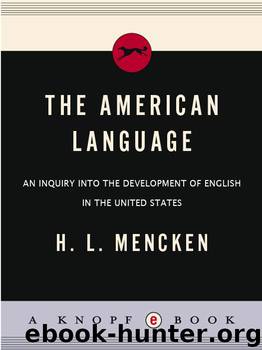American Language by H.L. Mencken

Author:H.L. Mencken
Language: eng
Format: mobi, epub
ISBN: 9780307808790
Publisher: Knopf Doubleday Publishing Group
Published: 2011-11-09T10:00:00+00:00
2. THE ADVANCE OF AMERICAN SPELLING
But such uncompromising defenders of English spelling lead a forlorn hope. Not only is there a general movement toward American forms in the newspapers — including the Times itself —; there is also a general yielding by English “authorities.” The Concise Oxford Dictionary of the Brothers Fowler, which came out in 1914, offers plenty of examples. The authors say in their preface that they “stop short of recognizing forms that at present strike every reader as Americanisms,” but they surely go far enough. In all the words ending in -ise and -isation the English s is changed to the American z. They prefer leveler to leveller and riveted to rivetted, though clinging sentimentally to traveller. They retain the first e in judgement, but omit it from likeable, and even go ahead of American usage by omitting it from mileage. They dismiss the -or ending as “entirely non-British,” but concede that it is necessary in horror and torpor. Finally, they swap the English y for the American i in tire, cider and siphon, recognize a as a variant for y in pyjama, concede that jail is as good as gaol, prefer the American asphalt to the English asphalte, toilet to toilette, and balk to baulk, and admit program, wagon, check (on a bank) and skeptic without precisely endorsing them. The monumental Oxford Dictionary upon which the Concise Oxford is grounded shows many silent concessions, and quite as many open yieldings — for example, in the case of ax, which is admitted to be “better than axe on every ground.” Moreover, many English lexicographers tend to march ahead of it, outstripping the liberalism of its editor, the late Sir James A. H. Murray. In 1914, for example, Sir James was still protesting against dropping the first e from judgement, but two years earlier the “Authors’ and Printers’ Dictionary,” edited by Horace Hart,14 Controller of the Oxford University Press, had dropped judgement altogether. “The Authors’ and Printers’ Dictionary” was, and is, an authority approved by the Master Printers’ and Allied Trades’ Association of London, the Edinburgh Master Printers’ Association, the Belfast Printing Trades Employers’ Association, and the executive committee of the London Association of Correctors of the Press, i.e., proofreaders. Hart is now dead, but the seventh edition (1933), revised by some unnamed hand, continues to show a great many characteristic American spellings. For example, it recommends the use of jail and jailer in place of the English gaol and gaoler, drops the final e from asphalte and stye, changes the y to i in cyder, cypher and syren, and advocates the same change in tyre, drops the redundant t from nett, changes burthen to burden, spells wagon with one g, prefers fuse to fuze, and takes the e out of storey. “Rules for Compositors and Readers at the University Press, Oxford,” also edited by Hart (with the advice of Sir James Murray and Dr. Henry Bradley) is another very influential English authority.15 It gives its imprimatur to
Download
This site does not store any files on its server. We only index and link to content provided by other sites. Please contact the content providers to delete copyright contents if any and email us, we'll remove relevant links or contents immediately.
Cecilia; Or, Memoirs of an Heiress — Volume 1 by Fanny Burney(32549)
Cecilia; Or, Memoirs of an Heiress — Volume 2 by Fanny Burney(31948)
Cecilia; Or, Memoirs of an Heiress — Volume 3 by Fanny Burney(31932)
The Lost Art of Listening by Michael P. Nichols(7494)
Asking the Right Questions: A Guide to Critical Thinking by M. Neil Browne & Stuart M. Keeley(5762)
We Need to Talk by Celeste Headlee(5608)
On Writing A Memoir of the Craft by Stephen King(4936)
Dialogue by Robert McKee(4389)
Pre-Suasion: A Revolutionary Way to Influence and Persuade by Robert Cialdini(4224)
I Have Something to Say: Mastering the Art of Public Speaking in an Age of Disconnection by John Bowe(3881)
Elements of Style 2017 by Richard De A'Morelli(3343)
The Book of Human Emotions by Tiffany Watt Smith(3304)
Fluent Forever: How to Learn Any Language Fast and Never Forget It by Gabriel Wyner(3079)
Name Book, The: Over 10,000 Names--Their Meanings, Origins, and Spiritual Significance by Astoria Dorothy(2983)
Good Humor, Bad Taste: A Sociology of the Joke by Kuipers Giselinde(2945)
Why I Write by George Orwell(2945)
The Art Of Deception by Kevin Mitnick(2798)
The Grammaring Guide to English Grammar with Exercises by Péter Simon(2741)
Ancient Worlds by Michael Scott(2682)
